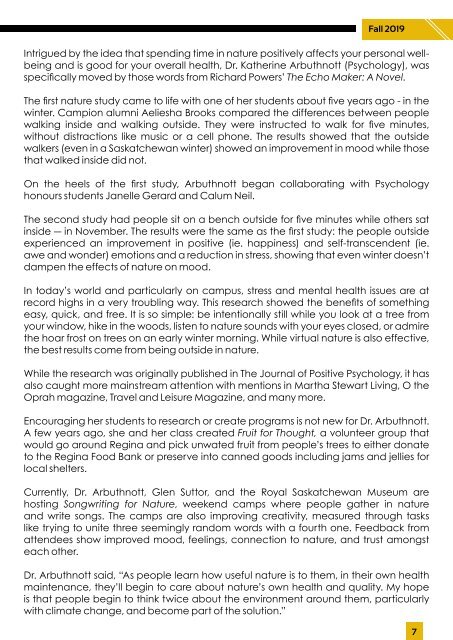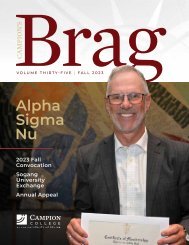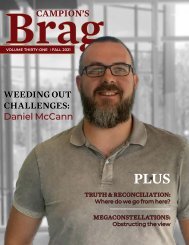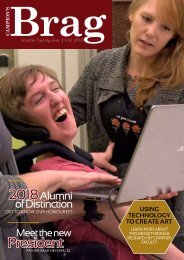Brag-Fall2019
You also want an ePaper? Increase the reach of your titles
YUMPU automatically turns print PDFs into web optimized ePapers that Google loves.
Fall 2019<br />
Intrigued by the idea that spending time in nature positively affects your personal wellbeing<br />
and is good for your overall health, Dr. Katherine Arbuthnott (Psychology), was<br />
specifically moved by those words from Richard Powers’ The Echo Maker: A Novel.<br />
The first nature study came to life with one of her students about five years ago - in the<br />
winter. Campion alumni Aeliesha Brooks compared the differences between people<br />
walking inside and walking outside. They were instructed to walk for five minutes,<br />
without distractions like music or a cell phone. The results showed that the outside<br />
walkers (even in a Saskatchewan winter) showed an improvement in mood while those<br />
that walked inside did not.<br />
On the heels of the first study, Arbuthnott began collaborating with Psychology<br />
honours students Janelle Gerard and Calum Neil.<br />
The second study had people sit on a bench outside for five minutes while others sat<br />
inside ― in November. The results were the same as the first study: the people outside<br />
experienced an improvement in positive (ie. happiness) and self-transcendent (ie.<br />
awe and wonder) emotions and a reduction in stress, showing that even winter doesn’t<br />
dampen the effects of nature on mood.<br />
In today’s world and particularly on campus, stress and mental health issues are at<br />
record highs in a very troubling way. This research showed the benefits of something<br />
easy, quick, and free. It is so simple: be intentionally still while you look at a tree from<br />
your window, hike in the woods, listen to nature sounds with your eyes closed, or admire<br />
the hoar frost on trees on an early winter morning. While virtual nature is also effective,<br />
the best results come from being outside in nature.<br />
While the research was originally published in The Journal of Positive Psychology, it has<br />
also caught more mainstream attention with mentions in Martha Stewart Living, O the<br />
Oprah magazine, Travel and Leisure Magazine, and many more.<br />
Encouraging her students to research or create programs is not new for Dr. Arbuthnott.<br />
A few years ago, she and her class created Fruit for Thought, a volunteer group that<br />
would go around Regina and pick unwated fruit from people’s trees to either donate<br />
to the Regina Food Bank or preserve into canned goods including jams and jellies for<br />
local shelters.<br />
Currently, Dr. Arbuthnott, Glen Suttor, and the Royal Saskatchewan Museum are<br />
hosting Songwriting for Nature, weekend camps where people gather in nature<br />
and write songs. The camps are also improving creativity, measured through tasks<br />
like trying to unite three seemingly random words with a fourth one. Feedback from<br />
attendees show improved mood, feelings, connection to nature, and trust amongst<br />
each other.<br />
Dr. Arbuthnott said, “As people learn how useful nature is to them, in their own health<br />
maintenance, they’ll begin to care about nature’s own health and quality. My hope<br />
is that people begin to think twice about the environment around them, particularly<br />
with climate change, and become part of the solution.”<br />
7

















